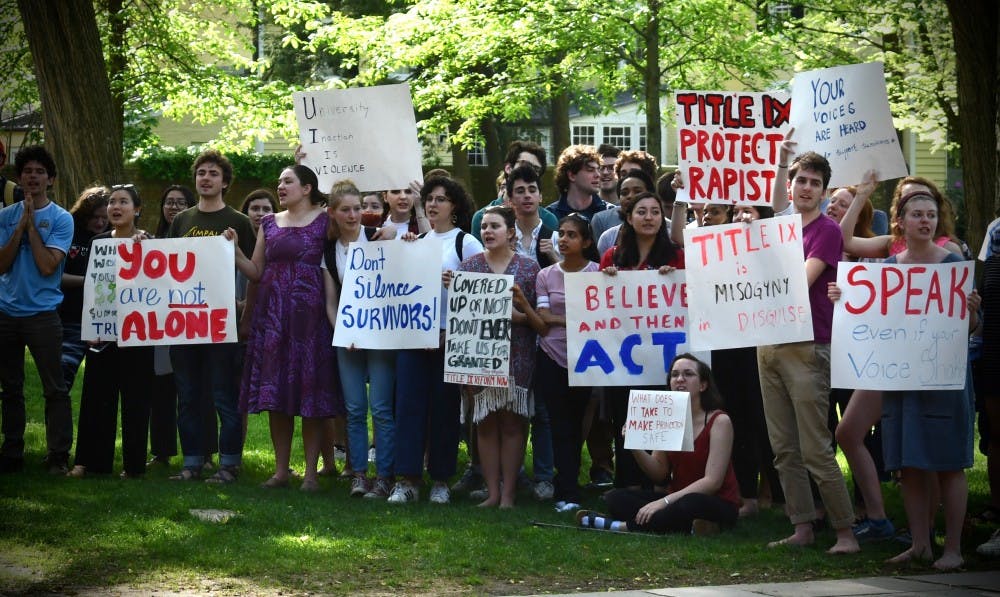On Feb. 4, The Daily Princetonian published an investigation documenting multiple allegations of what we view as predatory behavior and sexual misconduct against classics professor Joshua Katz, some of which reach back more than a decade. Two weeks later, Katz released a statement confirming he had a relationship with a former undergraduate student that violated University rules, and revealed that the administration allowed him to resume teaching after a yearlong unpaid suspension.
First, Princeton failed to adequately protect its students from harm; then, even after the administration learned that Katz had committed misconduct, it allowed him to return to the classroom with nothing but a slap on the wrist. This demonstrates a stunning failure of accountability. But to make matters worse, Katz has still not been removed from the classroom, even as some students express concern about taking classes with him.
Katz continues to dodge responsibility for his behavior, under the protection of the Princeton administration. As Princeton students and alumni, we view this as confirmation of the University’s total disregard for the safety of students who are vulnerable to sexual misconduct and harassment more generally. Survivors deserve better.
Princeton’s lack of support does not exist in a political vacuum: survivors of sexual assault and sexual misconduct have had dismal resources in recent years. Under the Trump administration, survivor-centered Title IX policies were further weakened and replaced by policies designed to protect the aggressor and decrease liabilities for institutions (Princeton adopted related policy changes in August 2020).
These policies included adding an antagonistic cross-examination of complainants to Title IX proceedings, limiting the scope of actions that violate Title IX, and narrowing the definition of sexual harassment. On March 8, Joe Biden signed an executive order directing the new Education Secretary Miguel Cardona to review the policies, but the case of Katz shows that survivors at Princeton need more than a return to the status quo. Reaching back into the mid-2000s, the allegations reveal the many deep insufficiencies surrounding existing and previous processes.
Princeton Students for Title IX Reform has long pointed out Princeton’s habit of failing to act or acting ineffectively in adjudicating cases of misconduct. Students have time and again reported feeling ignored and unprotected by the University’s Title IX office, or having experienced other forms of silencing. This culture makes learning and working on campus unsafe for all, in particular for survivors, and it must end. Advocates around the country are organizing for more than just a reversal of the Trump administration’s most harmful policies, and demanding substantial reform, and Princeton must finally act on its catastrophic failures in handling Joshua Katz and other alleged predators by creating a safe learning and working environment for all community members.
Until the University agrees to our demands, we intend to fight. That’s why we, Princeton Students for Title IX Reform (PIXR) and the Organizing Committee of Princeton Graduate Students United (PGSU), submitted the following demands to the administration, and have launched a social media campaign (here and here) highlighting the administration’s ongoing complicity in Katz’s misconduct. It’s time for Princeton to act.
We demand that the University:

- Provide financial support for all legal services related to Title IX cases. This support should not be limited to funding for any legal proceedings related to the case itself, but should also include funding for mental health support, as well as expenses related to further legal protections such as restraining orders.
- Hire transformative justice practitioners, who have particular expertise in forms of mediation, healing, and accountability surrounding sexual violence. These practitioners must include and center LGBTQ+ people and people of color, including Black, Indigenous, and Latinx people, and people from these groups should be consulted in future hiring processes.
- Hire more counselors that can specifically support survivors, and hire more counselors of different identities — especially Black, Indigenous, Latinx, and LGBTQ+-identifying counselors. The University must invest in more diverse types of therapy, including group therapy geared towards different communities. Right now, students of all identities experience massive wait times for counseling; this problem is exacerbated for BIPOC and LGBTQ+ students, whom the University does not provide with sufficient access to therapists who understand and reflect their identities.
- Provide affordable and accessible off-campus therapy, with easily accessible financial support. Resources for financial support should be widely publicized and shared with centers under the Office of Diversity and Inclusion.
- Mandate training for all students and faculty aimed at teaching healthy community behaviors by identifying and dismantling the intersecting forms of patriarchy, racism, and other forms of oppression that contribute to interpersonal violence. This training must include support for recognizing and intervening in predatory behavior, including grooming, by instructors and others in positions of power, and provide concrete resources for anyone experiencing or witnessing such behavior to seek or provide help to their fellow students.
- Establish a process of external review accessible to all degree-granting departments as a mechanism that can be called upon immediately and transparently by students or faculty in the event of sexual misconduct or other allegations of harm. This review process should be unbiased and should go beyond the forms of climate/Title IX review which are already available: it should have scope to transparently assess past allegations of misconduct and recommend changes in policy/procedure at administrative levels.
- Issue a full report on the allegations concerning Joshua Katz. This report must not be restricted in its scope to the reported allegations, but include the history of University responses to any allegations regarding misconduct by Katz, including which faculty members, staff, and administrators were made aware of the allegations and how they responded. Prior investigations have proven ineffective for dealing with these situations, as proven by the repeated allegations against Katz over multiple decades. This warrants a fuller and wider-ranging investigation than those which have previously occurred — one in which the University prioritizes the students harmed by its negligence rather than administrators’ desire to avoid liability.
- Commit to providing resources and legal aid to any students Joshua Katz may retaliate against for speaking out against his alleged misconduct.
- Although the Classics department took steps to allow students to switch out of Katz’s classes in response to the allegations in the ‘Prince,’ Katz is nevertheless set to teach undergraduates in the next academic year. Due to these allegations, and the documented case of misconduct to which Katz has admitted, our coalition’s position is that Katz’s continued presence in the classroom actively puts students in harm’s way. He should be prevented from teaching immediately. On top of removing him from the classroom, we also call for his ultimate termination from the University, to prevent the possibility of him continuing to use his position of authority to harm students.
While many of these demands focus on the systemic failures that enabled Katz’s alleged misconduct, they are by no means comprehensive. We encourage the administration to act on the proposals issued by Students for Title IX Reform in 2019, and to start listening to the survivors and activists they have silenced for far too long. We deserve better.
These demands were authored by Princeton Students for Title IX Reform (PIXR) and the Organizing Committee of Princeton Graduate Students United (PGSU). You can join PIXR and PGSU in supporting these demands here.









